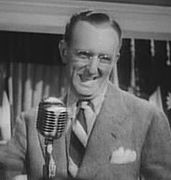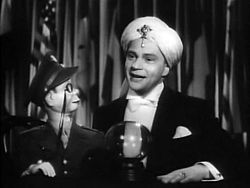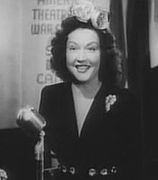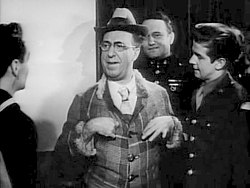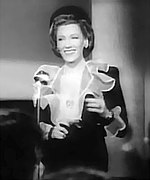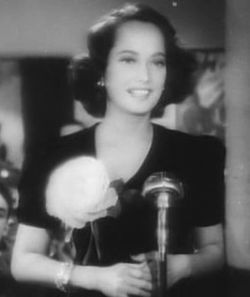Production
Stage Door Canteen was made under the auspices of the American Theatre Wing. The actual Stage Door Canteen in New York City was a basement club located in the 44th Street Theatre, [5] and it could not be used for the filming as it was too busy receiving servicemen. [6] The settings were recreated at the Fox Movietone Studio in New York and at RKO Pathé Studios in Los Angeles. Stage Door Canteen was in production from November 30, 1942, to late January 1943. [7]
Star appearances range from momentary cameos, such as Johnny Weissmuller working in the Canteen's kitchen, to more substantial roles. In a June 1943 feature story titled "Show Business at War", Life magazine counted a total of 82 performers in Stage Door Canteen, and provided total screen time for some of them:
- Ray Bolger, dancing (391 seconds)
- Edgar Bergen with Charlie McCarthy (248 seconds) and Mortimer Snerd (102 seconds)
- Gypsy Rose Lee, performing a "strip" on stage (331 seconds)
- Gracie Fields, singing the "Machine Gun Song" and "The Lord's Prayer" (197 seconds)
- Katharine Cornell, serving food with Aline MacMahon and Dorothy Fields and reciting from Romeo and Juliet with Lon McCallister (113 seconds)
- Ed Wynn, various scenes (101 seconds)
- Katharine Hepburn, appears at the close with Selena Royle and in a scene with Cheryl Walker which was written by Robert Sherwood (99 seconds)
- Ethel Merman, singing "Marching Through Berlin" (95 seconds)
- Alfred Lunt and Lynn Fontanne working in the kitchen (81 seconds)
- Tallulah Bankhead, working as a senior hostess (50 seconds)
- Ina Claire, mediating a dispute between sailors who want to dance with her (43 seconds)
- Helen Hayes, working as a senior hostess (43 seconds) [8]
Stage Door Canteen represents the only film appearance of Katharine Cornell. [6] It features a performance of "Why Don't You Do Right?" by Benny Goodman and His Orchestra, which became the first major hit for singer Peggy Lee. [9] Also featured are a tune by Count Basie and his band with Ethel Waters and two by violinist Yehudi Menuhin. African-American producer Leonard Harper was hired to do the African-American casting in New York City. [10]
Of additional cultural note are two segments, one in which Merle Oberon sings the praises of America's Chinese allies, represented by Chinese airmen, and another in which Sam Jaffe interviews several Soviet officers, one of them female, in both English and Russian.
Reception
Stage Door Canteen was named one of the ten best motion pictures of 1943 in a Film Daily poll of 439 newspaper and radio reviewers. [12]
The film received two Academy Award nominations—for the original score by Fred Rich, and for the original song, "We Mustn't Say Goodbye", by James V. Monaco (music) and Al Dubin (lyrics). [13]
Bosley Crowther, film critic for The New York Times , prefaced his remarks on the film by stating his aversion to the contemporary trend toward all-star spectacles, which he called "cheap showmanship":
But for once, we've got to make a frank concession. As done in Stage Door Canteen this parading of show-world notables has some real dramatic point. It shapes a glamorous, atmospheric setting within which a slight story is played—a setting as real as is the Canteen for a story that is old as the hills. … And, besides, some of the acts are pretty good. [11]
Crowther praised producer Sol Lesser for creating an illusion of authenticity by casting newcomers to the screen—"anybody's boys and girls … just so many nice kids at the Canteen." He credited the film for catching the generous spirit of show people wishing to do their part to help win the war. "As a general rule," he concluded, "this writer is depressed by a bandwagon of stars. But this is one time when the spectacle really brings a lump of pride to the throat." [11] In The Nation in 1943, critic James Agee wrote, "Stage Door Canteen is beautiful as a preview of a period piece. Any film is, but this one carries a saturation of the mannerism of fourth-decade entertainment, patriotism, and sub-idealized lovemaking which could supply almost any twenty others. The best of the patriotism is implicit rather than overt. The lovemaking is strictly church-supper. The entertainment is best. " [14]
All proceeds, after Lesser's 8.5 percent, were donated to the American Theatre Wing and its allied charities. [15] The film was such a success at the boxoffice that Lesser was able to turn over $1.5 million [16] —the equivalent of more than $20.5 million today. [17]
"Patriotism, entertainment, and romance mix badly", wrote modern critic Pauline Kael, who looked back on the film for The New Yorker . "Many famous performers make fools of themselves … Katharine Cornell, Katharine Hepburn, and Paul Muni fare a shade worse than most of the other 50-odd famous performers; Ray Bolger and Ed Wynn come off rather better." Kael termed the film "depressing" and particularly criticized Delmer Daves's "horribly elaborate narrative". [18] Dave Kehr of The New York Times called the film "an interesting document on World War II". [19]
This page is based on this
Wikipedia article Text is available under the
CC BY-SA 4.0 license; additional terms may apply.
Images, videos and audio are available under their respective licenses.







